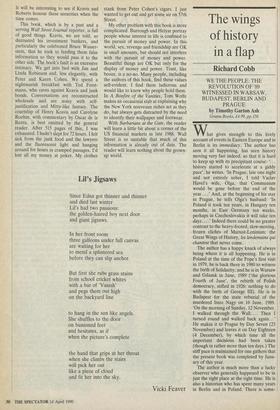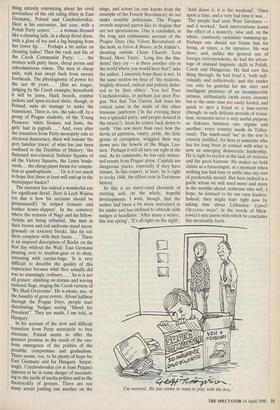The wings of history in a flap
Richard Cobb
WE THE PEOPLE: THE REVOLUTION OF '89 WITNESSED IN WARSAW, BUDAPEST, BERLIN AND PRAGUE by Timothy Garton Ash
Granta Books, £4.99, pp.I56
hat gives strength to this lively account of events in Eastern Europe and in Berlin is its immediacy. The author has seen it all happening, has seen history moving very fast indeed, so that it is hard to keep up with its precipitant course: '... history started to accelerate at a giddy pace', he writes. 'In Prague, late one night and not entirely sober, I told Vaclav Havel's wife, Olga, that Communism would be gone before the end of the year....' And, at the beginning of his stay in Prague, he tells Olga's husband: 'In Poland it took ten years, in Hungary ten months, in East Germany ten weeks, perhaps in Czechoslovakia it will take ten days.. ..' Indeed there could be no greater contrast to the heavy-footed, slow-moving, frozen clichés of Marxist-Leninism: the Great Wings of History, les lendemains qui chantent that never come.
The author has a happy knack of always being where it is all happening. He is in Poland at the time of the Pope's first visit in 1979, he is back there in 1980 to witness the birth of Solidarity; and he is in Warsaw and Gdansk in June, 1989 (`the glorious Fourth of June', the rebirth of Polish democracy, stifled in 1926: nothing to do with the birth of George III). He is in Budapest for the state reburial of the murdered Imre Nagy on 16 June, 1989. `On the morning of Sunday, 12 November, I walked through the Wall.... Then I turned round and walked back again...' He makes it to Prague by Day Seven (23 November) and leaves it on Day Eighteen (4 December), by which time all the important decisions had been taken (though in rather more than ten days.) The stiff pace is maintained for one gathers that the present book was completed by Janu- ary of this year.
The author is much more than a lucky observer who generally happened to be in just the right place at the right time. He is also a historian who has spent many years in Berlin and in Poland. There is some-
thing entirely convincing about his vivid portraiture of the old ruling elites in East Germany, Poland and Czechoslovakia. Here is his encounter, last year, with a Polish Party censor: `... a woman dressed like a cleaning lady, in a cheap floral dress, with a glass of tea and a fag hanging from her lower lip....' Perhaps a bit unfair on cleaning ladies! Then the rank and file of the Czech Communist Party: `... the women with putty faces, cheap perms and schoolmistress voices. The men in cheap suits, with hair swept back from sweaty foreheads. The physiognomy of power for the last 40 years....' (But no longer, judging by the Czech example; henceforth it will be jeans, black beards, combat jackets and open-necked shirts, though, in Poland, suits do manage to make the transition). There is, too, the take-off, by a group of Prague students, of the Young Pioneers: `white blouses, red bows, the girls' hair in pigtails....' And, even after the transition from Party monopoly rule to electoral democracy, there will remain 'the grey familiar traces' of what has just been confined to the Dustbins of History: 'the flattened neo-classical Stalinist façades of all the Victory Squares, the Lenin boule- vards... the cheap paper forms for comple- tion in quadruplicate....' Or is it too much to hope that these at least will end up in the wastepaper-basket?
The narrator has indeed a wonderful eye for significant detail. Here is Lech Walesa (so that is how his surname should be pronounced!) 'in striped trousers and leather house-slippers'. In the cemetery where the remains of Nagy and his fellow- victims are being reburied, 'the men in their brown and red uniforms stand incon- gruously on concrete blocks, like tin sol- diers complete with their bases....' There is an inspired description of Berlin on the first day without the Wall: East Germans pouring over to window-gaze or to shop, returning with carrier-bags: `It is very difficult to describe the quality of this experience because what they actually did was so stunningly ordinary. . ..' So it is not all gesture: climbing on statues and waving national flags, singing the Czech version of `We Shall Overcome'. He is aware, too, of the banality of great events. About halfway through the Prague Days, people start distributing 'badges saying "Havel for President". They are made, I am told, in Hungary.'
In his account of the slow and difficult transition from Party monopoly to free elections, Poland seems to offer the greatest promise as the result of the cau- tious emergence of the politics of the possible: compromise and gradualism. There seems, too, to be plenty of hope for East Germany and for Hungary. Surpri- singly, Czechoslovakia (or at least Prague) appears to be in some danger of succumb- ing to the perils of media politics and to the theatricality of gesture. There are too many actors jostling one another on the stage, and actors (as one knows from the example of the French Revolution) do not make sensible politicians. The Prague crowds respond parrot-like to slogans that are not spontaneous. One is reminded, in the long and enthusiastic account of the Prague Days (the Velvet Revolution) of the mob, in Sylvie & Bruno, in St Aldate's, shouting outside Christ Church: 'Less Bread, More Taxes'. 'Long live the Stu- dents! they cry — is there another city in the world where you would hear that?' asks the author. I sincerely hope there is not. In the same section we hear of 'the students, brightly dressed, radical and politely defer- red to by their elders'. You bet! Poor Czechoslovakia, or perhaps just poor Pra- gue. Not that Tim Garton Ash loses his critical sense in the midst of this often tiresome jamboree (In the evening there was a splendid party, and people danced in the streets'). Soon he comes back down to earth: 'One saw more than once how the devils of ambition, vanity, pride, the little germs of corruption, wriggled their way down into the bowels of the Magic Lan- tern.' Perhaps it will all turn out right in the end. As he comments, he has only witnes- sed events from Prague alone. Capitals are dangerous places, especially if they have statues. In this respect, at least, he is right to evoke 1848, the silliest year in European history. So this is no starry-eyed chronicle of exciting and, on the whole, hopeful developments. I wish, though, that the author had been a bit more restrained in his asides and less inclined to obtrude with nudges or headlines: 'After many a winter, this was spring', 'It's all right on the night', `And damn it, it is the weekend'. 'Once upon a time, and a very bad time it was...' `The people had seen West Germany and it worked.' Such interventions lessen the effect of a masterly, wise and, on the whole, cautiously optimistic summing-up. 'Perhaps one should not blame him for being, at times, a bit intrusive. He was there, and, unlike the general run of foreign correspondents, he had the advan- tage of unusual linguistic skills in Polish, Czech and Hungarian. He had seen this thing through, he had lived it, both indi- vidually and collectively; and the reader can only be grateful for the alert and intelligent presence of an incomparable witness, enthusiastic (with every reason) but at the same time not easily fooled, and quick to spot a fraud or a time-server (though, in such delicate periods of transi- tion, turncoats serve a very useful purpose as linkmen between one regime and another: every country needs its Talley- rand). The much-used 'we' in the text is entirely justified, for here is someone who has for long been in contact with what is now an emerging democratic leadership. He is right to rejoice at the lack of violence and the good humour. He makes no bold claims as a futurologist, at a moment when nothing has had time to settle into any sort of predictable mould. But here indeed is a guide whom we will need more and more in the months ahead, someone who will, I hope, be listened to by our own leaders. Indeed, they might start right now by asking him about Lithuania: Litwo! Ojczyzno moja!, in the words of Mick- iewicz's epic poem with which he concludes this invaluable book.
'I'm worried. He just seems to want to play with the



















































 Previous page
Previous page